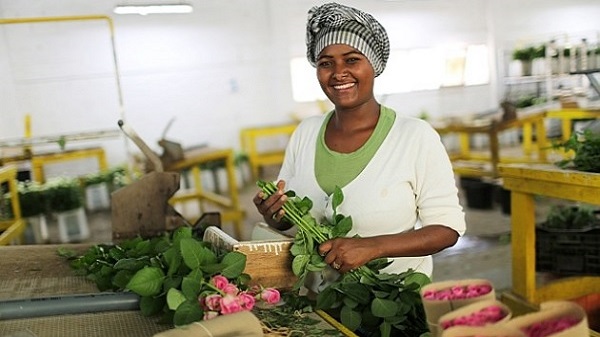
Ethiopia has become a major force in global floriculture in the past two decades, exploiting a tropical high-altitude climate that provides year-round perfect weather and light conditions for bringing plants into bloom.
By Carolina Millan & Nizar Manek (Bloomberg)
Ethiopia’s burgeoning flower-growing industry is setting its sights on the U.S. in a bid to break the dominance of Latin American producers in supplying roses and other blooms to the world’s largest economy.
State-owned Ethiopian Airlines Enterprise is evaluating freighter flights through Miami — the main entry point for U.S. flower imports — Los Angeles or New York, regional manager Girum Abebe said in an interview. The company currently transports stems there only in the bellies of passenger jets.
Ethiopia has become a major force in global floriculture in the past two decades, exploiting a tropical high-altitude climate that provides year-round natural light combined with hot days and cold nights perfect for bringing plants into bloom. The conditions mirror those found in the Andes, where growers in Ecuador and Colombia currently dominate flower exports to the U.S.
“Ten or 15 years ago Ethiopia was not exporting a single rose, but now we have earned our position in the world market,” Girum said. “North America has been the major importer of horticulture products from other parts of the world, so we want to have part of that.”
Ethiopian flower exports are currently focused on Europe, and have made the country Africa’s second-biggest producer after Kenya and fourth-equal worldwide, according to Rabobank research based on 2015 figures. About 80 percent of Ethiopian production is flown to the Netherlands, the center of the global flower trade, and re-exported from there.
‘Bigger Blooms’
“Most people don’t know it but the flower market is very much a global one,” Amsterdam-based Rabobank floriculture analyst Cindy van Rijswick said. “Ethiopia is doing so well because its labor costs are a bit cheaper than Kenya and if anything its climate is even better, producing bigger blooms.”
European flower sales have been flat in recent years, encouraging growers to look at opportunities for penetrating trans-Atlantic markets, she said.
The expansion of North American flights will require a revision of existing air-service treaties between Ethiopia and the U.S. and Canada, said Girum, who spoke in Buenos Aires and oversees his company’s Latin American business. The African Growth and Opportunity Act, aimed at fostering U.S. trade with the sub-Saharan region, has helped encourage flower exports on a limited basis and was extended for 10 years in 2015.
Read the complete story at Bloomberg
——
See also:
- Ethiopia Offers New Land for Horticulture
- EVENT: Hortiflora Expo 2018 in Addis Ababa
- EHPEA Endeavoring to Promote Ethiopia’s Horticulture Products
- Ethiopia Launches National Horticulture Production and Marketing Strategy
- Coming up Roses in Ethiopia: A Flower Company Transforms Its Host Community
